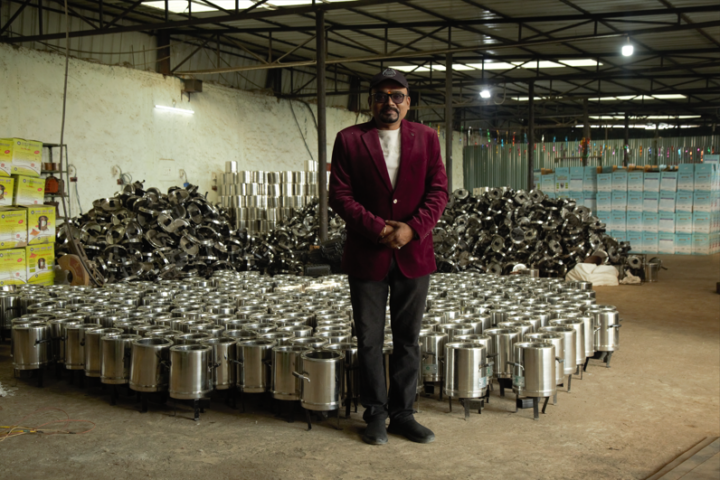Kenya
Country
Biomass, Clean Cooking
Technology
Scale-up
Business type
Investment amount raised with PFAN support (USD thousands)
340
Investment ask (USD thousands)
200
Project IRR (upside, %)
30
Peak power demand reduction (MW)
20
GHG mitigation impact (tonnes of CO2e/year)
20950
Over 50% of Nepal’s population depends on biomass fuels and open fires for cooking, adversely affecting public health, contributing to environmental degradation and climate change and disproportionately burdening women and girls with fuel collection and meal preparation. In response to these challenges, the Government of Nepal has set the goal of achieving universal access to clean cooking by 2030.[1]
The traditional stoves commonly used in Nepal are basic structures constructed from clay, stone or metal tripods, which often lack efficient airflow and insulation. Consequently, they consume large amounts of biomass and waste a significant amount of heat, leading to high levels of indoor air pollution. To enhance the socio-economic development of rural communities, the Government of Nepal is promoting the Improved Cook Stove (ICS) programmes with the aim of providing access to clean cooking technology and fostering a thriving market for clean cookstoves.

Founded 2013 in Birjung, Nepal, Husk Power Nepal Pvt. Ltd. offers clean cookstoves to alleviate indoor pollution in impoverished and marginalised households across Nepal. They manufacture metallic improved cook stoves (MICS), which offer better fuel efficiency, reduced smoke emissions and improved indoor air quality, unlike traditional open-fire cooking methods.[2] “A maximum of 20% firewood is sufficient for cooking with this stove. You can also use twigs, husks, leaves or any other biomass”, says Manoj Kumar Gupta, Managing Director of Husk Power Nepal.
The rural population in Nepal faces limited access to electricity, liquid petroleum gas (LPG) and kerosene due to low purchasing capacity and inadequate infrastructure. Consequently, they rely on firewood, agricultural residues, animal dung and traditional fuels like petroleum and coal for energy. Husk Power Nepal offers a clean and sustainable alternative through the development and production of their MICS. According to customer Sharmila Tamang, “With the help of this [clean cooking] stove, it has become very easy for us since it uses less firewood, which we have to bring from the jungle”.

Husk Power Nepal’s stoves offer significant benefits, having an efficiency of over 41%, saving up to 80% of firewood and reducing smoke by 95%, all while consuming minimal electricity. However, these improved cookstoves (ICS) still require firewood. To address this, Husk Power produces husk pellets, serving as a cleaner and effective substitute for firewood and replacing diesel and LPG. It is also estimated that the GHG emissions will decrease by approximately 2.5 tonnes per stove annually.[3]
PFAN support was instrumental in the company obtaining funding from various domestic investors. “When we first started this project, there were many challenges. Initially, the banks were not ready to invest in this sector. PFAN has helped us to improve our documentation and provided us with the knowledge to help us succeed. Before it was just a stove factory, now we have developed a fuel factory as well”, says Manoj.
Their PFAN Advisor, Sujan Paudel, “Nepal is fortunately very rich in resources: renewable energy and clean energy. But then the problem is in developing the investable bankable projects, and that’s where PFAN comes in. The investor will get an attractive return or reasonable return”.

Going through the steps of the PFAN Journey, improving their business plans and refining their proposals increases a project’s bankability and decreases risk. Dinesh Dulal, Head of Sustainable Banking at NMB Bank, emphasises that project developers and entrepreneurs who have received support add value and increase the likelihood of securing funding from the bank and other development parties.
Since PFAN support, Husk Power Nepal has sold over 29,000 of their clean cookstoves. “Eventually, every household needs to have an improved and more energy-efficient cook stove,” says Manoj.
The impact is tangible – student, Sabina Paudel, has more time available for studying. “Before, it used to take a lot of time to cook. Now, with this stove, it’s much quicker. It ignites instantly, maintains a steady heat without producing smoke and is much more convenient for cooking.”
Husk Power Nepal - Success Story Video
[1] https://www.ccacoalition.org/news/measurement-tools-accelerate-clean-cooking-potential-nepal#:~:text=In%20Nepal%20%E2%80%93%20where%20over%2050,to%20clean%20cooking%20by%202030.
[2] https://trello.com/c/azoVmpH4/60-husk-power-nepal-tier-3-plus-improved-cook-stoves
[3] https://trello.com/c/azoVmpH4/60-husk-power-nepal-tier-3-plus-improved-cook-stoves
